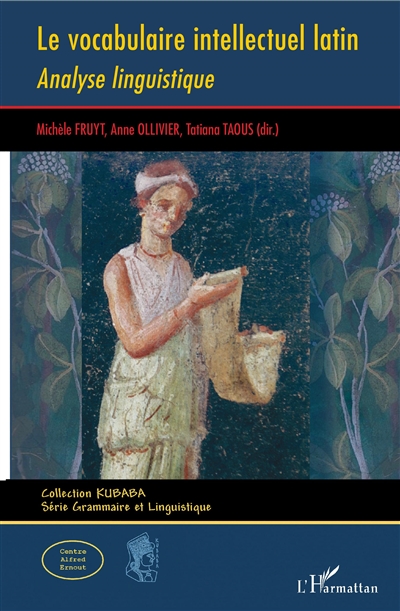en savoir plus

Permet à tous ses détenteurs d'obtenir 5% de réduction sur tous les livres lors du retrait en magasin (réduction non cumulable avec les réductions de type étudiant).
Offre également un certain nombre d'avantages auprès de nos partenaires.
Avec les favoris, retrouvez dans un espace les sélections effectuées au fur et à mesure de vos navigations dans le site.
Constituez pour votre usage personnel vos listes de livres en prévisions d'achats futurs et votre sélection d'articles, dossiers, événements, vidéos ou podcasts préférés ou à découvrir plus tard...
Il suffit simplement de cliquer sur "Ajout Favori" sur chaque page qui vous intéresse pour les retrouver ensuite dans votre espace personnel.
Requiert un compte Mollat
Requiert un compte Mollat
- Sciences - Savoirs
- Dictionnaires - Langues
- Langues universitaires - Dictionnaires et méthodes
- Langues anciennes dictionnaire universitaire
Le vocabulaire intellectuel latin : analyse linguistique
en savoir plus
Résumé
Les contributeurs analysent vingt termes latins fondamentaux, sous tous leurs aspects linguistiques et dans une perspective diachronique. Les dimensions linguistique, littéraire, morale et politique sont examinées pour chaque vocable, choisi pour son importance dans l'histoire des mentalités et de la société romaine, tel que allegoria, exigere, potentia et signum. ©Electre 2025
Quatrième de couverture
Le vocabulaire intellectuel latin
Analyse linguistique
20 termes latins essentiels pour la langue latine et la société romaine sont analysés sous tous les aspects linguistiques depuis le latin archaïque jusqu'aux langues romanes. Par leur pérennité culturelle et linguistique, ils sont toujours au fondement de notre société contemporaine, avec quatre domaines centraux :
- linguistique : bilinguis « bilingue », cognoscere « connaître, savoir », examen « analyse », fabula « conversation », precari « prier », sermo « conversation, énoncé », signum « signe », uerbum « mot, énoncé, paroles » ;
- littéraire : allegoria « allégorie », fabula « histoire », sermo « sermon » ;
- social et moral pour le jugement collectif sur l'individu : contumelia « offense », existimatio « estime », fama « réputation », gloria « gloire », laus « louange », quaerere « (re)chercher », uanitas « vanité », etc. ;
- politique : libertas « liberté », potentia « puissance, pouvoir ».
L'emploi de l'analyse sémique (C. Moussy) et de l'analyse lexématique (B. García- Hernandez) est une originalité notable.
20 Latin terms essential for an understanding of the Latin language and of Roman society are analysed here in all their linguistic aspects from Early Latin to the Romance languages. Owing to their continuing cultural and linguistic importance, they are still fundamental to our understanding of modern society, with four core domains :
- linguistic : bilinguis « bilingual », cognoscere « know », examen « analysis », fabula « conversation », precari « pray », sermo « conversation, discourse », signum « sign », uerbum « word, speech ».
- literary : allegoria « allegory », fabula « story », sermo « sermon ».
- social and moral regarding the judgement of the community on the individual : contumelia « offence », existimatio « esteem », fama « reputation », gloria « glory », laus « praise », quaerere « seek », uanitas « vanity », etc.
- political : libertas « liberty », potentia « power, force ».
A notable originality here is the use of semic analysis (school of C. Moussy) and lexematic analysis (school of B. García-Hernandez).
Fiche Technique
Paru le : 05/10/2020
Thématique : Langues anciennes dictionnaire universitaire
Auteur(s) : Non précisé.
Éditeur(s) :
L'Harmattan
Collection(s) : Kubaba
Contributeur(s) : Directeur de publication : Michèle Fruyt - Directeur de publication : Anne Ollivier - Directeur de publication : Tatiana Taous
Série(s) : Non précisé.
ISBN : 978-2-343-20827-5
EAN13 : 9782343208275
Reliure : Broché
Pages : 326
Hauteur: 24.0 cm / Largeur 16.0 cm
Épaisseur: 1.8 cm
Poids: 520 g

